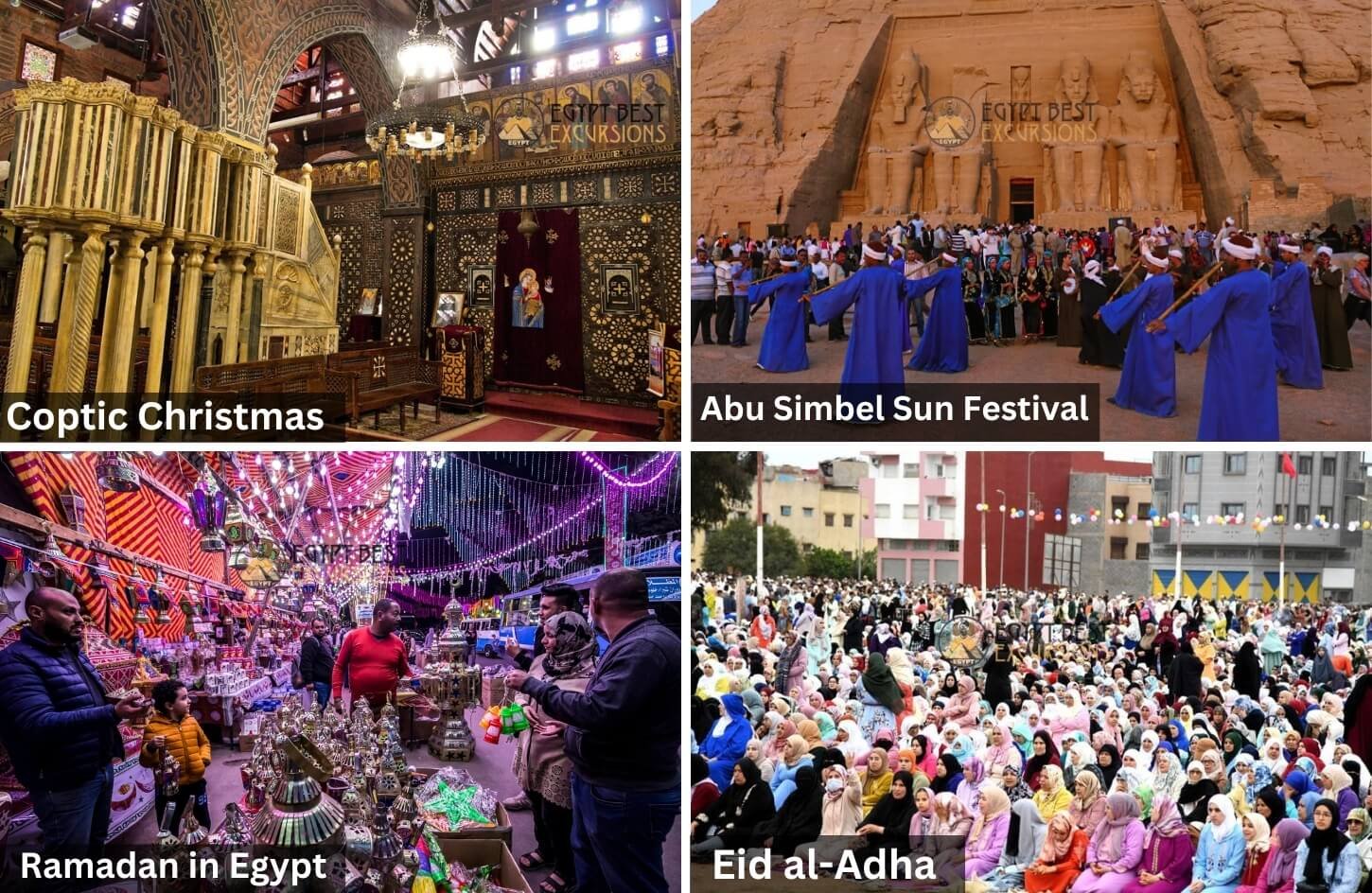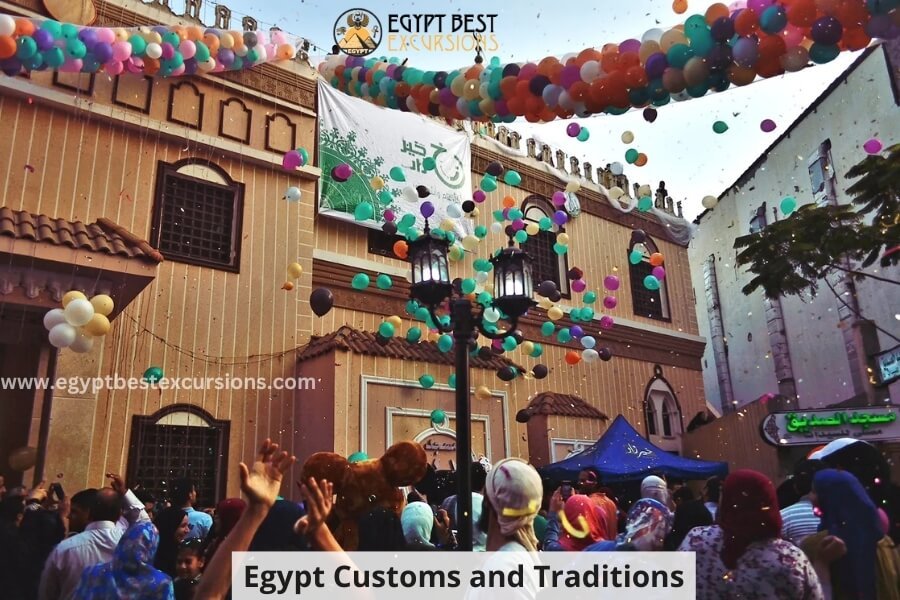Egypt is where ancient wonders meet vibrant modern life, creating a unique blend of Egyptian culture and traditions that captivate the world. From the grandeur of the ancient Egypt culture, with its awe-inspiring Giza pyramids, Abu Simbel Temple, and sacred rituals, to the lively Egypt Celebrations and Festivals that color the streets today, Egypt’s heritage is a living testament to millennia of tradition.
Whether it’s the deep-rooted Egypt customs and traditions that shape daily life or the echoes of ancient Egyptian culture and traditions seen in modern practices, every corner of this fascinating country tells a story. The warmth of hospitality, the significance of family, and the rich flavors of Egyptian cuisine are just a few aspects of Egyptian culture and customs that continue to thrive.
Join us as we explore the heart of Egyptian traditions and culture, uncovering the customs that define this extraordinary civilization.
You Can Book Now to Ensure that you Spend Holidays in Egypt 2025 with Complete Comfort Through our Best Offers on Packages or Day Tours
Key Takeaways
- Egypt’s culture is a blend of ancient Egyptian traditions and modern influences, creating a unique heritage.
- Egypt customs and traditions focus on hospitality, strong family values, and deep-rooted religious practices.
- Festivals and celebrations in Egypt reflect its diverse history, with Islamic, Christian, and national holidays.
- Ancient Egypt culture continues to influence modern Egyptian life, from language to art and architecture.
- Visitors can experience Egyptian traditions and culture through local markets, music, dance, and food.
- Booking a trip with us ensures an authentic cultural experience, guided by local experts.
Egyptian Culture and Traditions: A Journey Through Time
Egypt is a country where the past and the present seamlessly merge. With a history spanning over 7,000 years, Egyptian culture and traditions are deeply rooted in ancient customs while embracing modern influences. Whether you’re exploring the bustling streets of Cairo, sailing the Nile, or visiting a traditional village, you’ll experience a culture that is as warm as it is fascinating.
Egyptian Customs and Traditions: A Deep-Rooted Heritage
Egyptians take pride in their hospitality, family values, and religious practices. Here are some key cultural aspects every traveler should know:
1. Egyptian Hospitality: A Warm Welcome Awaits
Egyptians are known for their generosity and warm hospitality. When visiting a home, it’s customary to bring a small gift, such as sweets or flowers. Guests are often greeted with traditional tea or coffee, symbolizing warmth and respect.
2. Family Values and Social Life
Family is the cornerstone of Egyptian culture and customs. Extended families often live together or maintain strong connections. Respect for elders is deeply ingrained, and gatherings are a vital part of daily life.
3. Religion’s Influence on Daily Life
Islam is the dominant religion, shaping many traditions, while Egypt’s Christian minority also plays a significant cultural role. Friday prayers, Ramadan fasting, and Coptic Christmas are key religious observances.
4. Egyptian Cuisine: A Taste of Tradition
Food is central to Egypt customs and traditions. Staples include koshari (a mix of pasta, rice, and lentils), ful medames (fava beans), and molokhia (a green soup). Sharing meals is an important social practice.
Ancient Egyptian Culture and Traditions: The Legacy Lives On
The grandeur of ancient Egypt culture still shapes modern Egypt. From language to architecture, its impact is undeniable.
1. Hieroglyphics and the Arabic Language
While modern Egyptians speak Arabic, many words and names trace back to ancient hieroglyphics, preserving the linguistic heritage.
2. Ancient Architecture in a Modern World
The Pyramids of Giza, temples of Luxor, and tombs of the Valley of the Kings stand as a testament to Egypt’s architectural mastery. Even contemporary designs incorporate elements inspired by pharaonic art.
3. Traditional Egyptian Clothing
While modern fashion prevails in cities, traditional attire like the galabeya (a long robe) is still worn, especially in rural areas. Egyptian jewelry, influenced by pharaonic designs, remains popular.
4. Music and Dance: A Cultural Expression
Egyptian music blends ancient rhythms with modern influences. Belly dancing, known as Raqs Sharqi, originated in Egypt and remains a cultural icon.
Festivals and Celebrations in Egypt

Egypt has a rich history of celebrations, blending ancient traditions with modern festivities. Egyptian culture and traditions shine through religious, national, and cultural events, creating a vibrant atmosphere throughout the year. From Islamic and Christian holidays to centuries-old festivals, Egypt customs and traditions offer a unique glimpse into the country’s heritage.
Islamic and Christian Festivals
Ramadan and Eid Al-Fitr
Ramadan is one of the most significant Islamic festivals in Egypt. It is a holy month of fasting, prayer, and reflection. Muslims fast from sunrise to sunset, breaking their fast with a meal called “Iftar.” Families gather to enjoy traditional Egyptian dishes, and streets light up with colorful decorations.
Eid Al-Fitr marks the end of Ramadan with three days of celebrations. It is a time for feasts, visiting relatives, and giving to those in need. Egyptian culture and customs emphasize hospitality, and people exchange gifts, wear new clothes, and share festive meals.
Coptic Christmas (January 7th)
Egypt has a large Christian community, mainly Coptic Orthodox, who celebrate Christmas on January 7th. The night before, churches hold special midnight masses. Families gather for festive meals featuring traditional dishes like “fatta,” a dish made with rice, bread, and meat. This holiday reflects the deep-rooted Egyptian traditions and culture.
National and Cultural Celebrations
Sham El-Nessim: A Pharaonic Spring Festival
Sham El-Nessim is an ancient festival dating back to Pharaonic times. Celebrated on the Monday after Easter, it welcomes spring with outdoor picnics. Egyptians enjoy traditional foods like salted fish (fesikh), green onions, and boiled eggs. This festival is a perfect example of how ancient Egyptian culture and traditions continue to influence modern life.
Pharaonic New Year (Wepet Renpet)
The Pharaonic New Year, known as Wepet Renpet, honored the ancient Egyptian calendar. While it is no longer an official celebration, historians and cultural enthusiasts recognize it as a key part of ancient Egypt culture. The festival once involved grand ceremonies, temple rituals, and offerings to the gods. Today, it remains a symbol of Egypt’s enduring history.
Abu Simbel Sun Festival
The Abu Simbel Sun Festival is one of the most remarkable events in Egypt, showcasing the genius of ancient Egyptian culture and traditions. Held twice a year, on February 22nd and October 22nd, the festival marks the precise alignment of the sun with the temple of Abu Simbel. On these dates, sunlight illuminates the inner sanctum of the temple, lighting up the statues of Ramses II and the gods Amun and Ra, while Ptah, the god of darkness, remains in shadow.
Crowds gather at dawn to witness this incredible solar event, followed by traditional Nubian music, dance performances, and festivities celebrating Egypt’s rich heritage. The festival highlights the advanced astronomical knowledge of the ancient Egyptians and remains a key attraction for locals and visitors alike.
Modern Festivals
Cairo International Film Festival
One of the most prestigious film festivals in the Arab world, the Cairo International Film Festival brings global and local cinema to the heart of Egypt. Filmmakers, actors, and movie lovers gather to celebrate storytelling and artistic expression. This festival highlights Egypt’s role in the entertainment industry and its deep cultural appreciation for the arts.
Sphinx Festival: A Celebration of Egyptian Art and Music
The Sphinx Festival showcases Egypt’s artistic heritage, featuring music, dance, and traditional crafts. Visitors experience the richness of Egyptian traditions and culture through performances and workshops. The festival aims to preserve and promote Egypt’s artistic legacy while providing an immersive cultural experience.
Conclusion: Egyptian culture and customs
Egyptian culture and traditions are deeply rooted in history, blending ancient customs with modern celebrations. From religious holidays to cultural festivals, each event reflects Egypt’s rich heritage and vibrant spirit. Whether honoring Pharaonic traditions, Islamic and Christian festivities, or contemporary arts, festivals, and celebrations in Egypt bring people together in joy and unity.


0 Comment